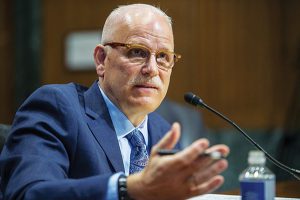Bloomberg
Four months into a sweeping ban on imports from China’s Xinjiang region, the top US customs official is signaling confidence that companies are observing the embargo.
“There are going to be some rough spots along the way, but I think we’ve been off to a remarkably good start,†Chris Magnus, the commissioner of US Customs and Border Protection, said in an interview at the Bloomberg News Washington office on Thursday.
The ban, which is aimed at pressuring Beijing over the forced labor of the minority Uyghur Muslims in Xinjiang, puts the onus on importing companies to ensure none of their goods were even partially made in that region. The blanket measure has threatened to reshape the broader US-China trade relationship.
“We’re seeing good examples of compliance so far,†Magnus said. “When you start to have some success stories, business starts to become more comfortable that there’s a way to work with this act — and the issue of forced labor in general.â€
Magnus pointed to popular support for the legislation. President Joe Biden signed the Uyghur Forced Labor Prevention Act, or UFLPA, in December after it was passed without opposition in the Senate and by a 428-1 vote in the House.
“Ultimately this comes down to the American public wants this —the consciousness has by and large been raised about this issue,†the customs chief said. “People want to buy products that they can feel confident are not made with forced labor.â€
Under the UFLPA, the US government assumes that anything made even partially in Xinjiang is produced with forced labor and can’t be imported unless companies are able to provide “clear and compelling evidence†otherwise.
The new process effectively supplanted about a dozen existing orders barring the import of some goods from Xinjiang, including cotton, tomatoes and solar-panel material.
 The Gulf Time Newspaper One of the finest business newspapers in the UAE brought to you by our professional writers and editors.
The Gulf Time Newspaper One of the finest business newspapers in the UAE brought to you by our professional writers and editors.
